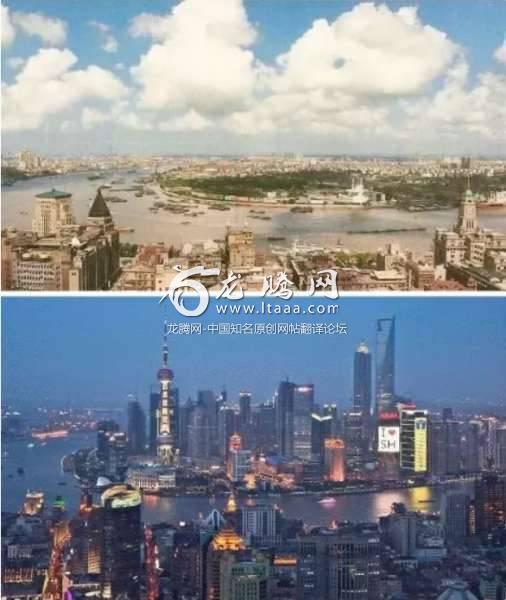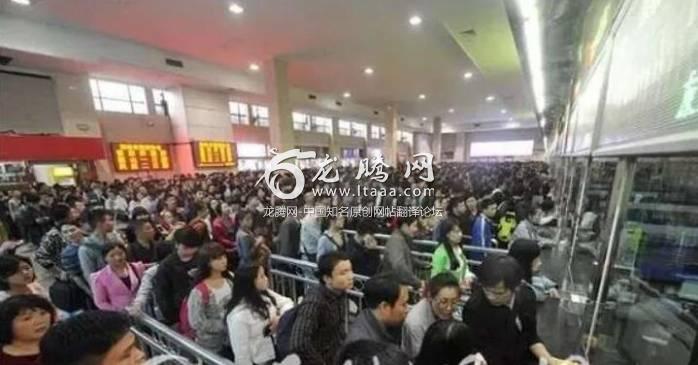中国和日本,将来哪个国家更宜居? [美国媒体]
quora网友:我是个外国人,在中国住了将近9年,同时呢,我在日本也有两个亲戚,他们在日本居住也已经超过10年了。我个人来看,住在中国会更好一点,尤其是在“将来”。中国:1 发展:过去的20年,中国经济的快速发展,在世界范围内都是史无前例的,是闻所未闻的。更重要的是,接下来的时间里,中国还将继续发展。
In the future, would it be better living in China or Japan?
中国和日本,将来哪个国家更宜居?
论坛地址:Rachel Zhang, Computer Science
I’m Chinese girl and I’m dating with a Japanese guy now. Have been to japan for several times , traveled to a lot of places (big cities and countryside), and lived with his family for a couple of weeks (including his sister, parents and even went to his grandparents’ house once, which covers basically all generations).
When comparing these two countries, we already know that Japan is a developed country and China is still developing country, which means your life experiences in Japan would be much better from both hardware and software perspectives.
But here are something I don’t like about Japan, and probably people wouldn’t know if they haven’t live there for a long period or have deeper relationship with Japanese people. Traveller could see the advancement but that’s just superficial.
These aspects (and in such big scale), as far as I know, can be seen only in Japan.
Japan is a weird country, really. It’s extraordinarily modernised and technologically advanced, but their minds, values and family relationships are so traditional, conservative and underdeveloped. It’s a bit common for many Japanese women to seek for next boyfriend when they’re still dating one, and money works better than anything if a man wants to win her heart.
For Japanese people, especially males, the achievement and devotion in their life career outweighs anything else, including family. So it’s very common that a Japanese man works at another city or country for years or even decades according to the order of his company, and his wife and children wouldn’t feel anything bad. For Chinese or Westerners, if our love ones lives in a city while there’s a great opportunity for self-improvement in another county, most people prefer staying with their lovers, which sounds stupid to Japanese.
I guess gender stereotypes could be reason for 1 and 2. Gender stereotypes and inequalities are too common in Japanese society. (Well this is also true for many parts of China, but personally I would say in Japan it's more severe and mosy Japanese people have little intention for changing.)
Japan, as I know, is a nation with the most severe conformity. Although there are some mavericks in big cities like Tokyo, they are actually never accepted by main stream. For a Japanese student or employer, the most horrible things (which could lead to depression) is being excluded by others. For example, my boyfriend never leave a party before it ends, even if me or his family needs him. His sister gets home after 21:00 (sometimes even 24:00) everyday because there’s gathering of colleagues after work. Though they are in fact tired and have to get up around 6:00 next morning, they never make absence.
In Japan, life-time employment is still the main stream and valued by most people. Resignation is sometimes more severe than divorce for the more traditional.
In order to be part of conformity, except for making no absence in every gathering, when other people are working overtime, some Japanese people stays at workplace too, even if they don’t have that much work to do.
Update: as mentioned by the anonymous answerer, most Japanese people lacks international views. Some international students I know said they've been asked several times by Japanese students about “is there coca-cola in your country?”
Update: averagely, Japanese youngsters are degenerating. More and more young people are becoming lacking of responsibility, honesty and motivation. Education is foundamental for longterm development, and its effect can't be seen until decades later. I think Chinese extraordinary youngsters beats Japanese excellent ones in both number and quality. However, suffering from regional development imbalances, Chinese youth education is still worse off than Japan on average scale.
It will make you astonished when you compare Japan’s modernisation and technology advancement with its underdeveloped and traditional mind-state. Though some Japanese youngsters are changing their mind, the main tendency of society remains.
If you’re planning to work in China or Japan, I’d say China is better. Chinese people are comparatively more open minded. If you’re planning to travel, both countries have plenty to do and see, and the experience might be more satisfying in Japan considering its advancement.
(Update: things I said about China are mainly about big cities, which are the only places comparable to Japan.)
我是个中国女生,现在的男朋友是个日本人。日本,我去过几次,也在许多地方旅游过,大城市啊,乡下啊,都去过。我在男朋友家住了几个星期,曾跟他的爸爸妈妈和姐姐生活在一起,期间,我们还拜访了他的爷爷奶奶,我接触的人,涵盖了日本几代人。
我们都知道,日本是个发达国家,中国是个发展中国家,日本的软件设施和硬件设施都是优于中国的,所以在日本生活,你会过得更好些。
但是,日本也有我不喜欢的地方。一个人,如果没在日本长期住过,或者跟日本人没有深层的关系,你是看不到日本不好的一面的。旅游的人,只能看到日本先进的一面,对日本的认知往往是肤浅的。
以下这些方面,大多数情形下,只能在日本看到:
1 日本是个非常怪的国家。日本这个国家非常现代化,科技也非常先进,但是日本人的思想、价值观和家庭关系,却非常的传统、保守和落后。有个非常普遍的现象,日本女人和一个男人约会的时候,她们已经在寻找下一个男朋友了,如果一个男人想要获得日本女人芳心的话,钱比什么都管用。
2 对日本人来说,特别是日本男人,职业生涯的成就和贡献比什么都重要,甚至比他的家庭都重要。有种现象在日本很普遍:一个日本男人听从公司的调遣,到另外一个城市或者另外一个国家,一呆就是几年甚至几十年,而他的老婆孩子居然会认为这是正常的。对于中国人和西方人来说,一个国家即使好的发展机遇,他们大多数人也还是会选择留下来,跟爱人生活在一起,而这在日本人看来是非常愚蠢的。
3 我也想过,日本存在的性别歧视,可能是第一种和第二种现象的原因。在日本社会,性别歧视和性别不平等的现象,是普遍存在的。这种现象在中国的许多地区,当然也存在,但没这么普遍。在我看来,日本社会的这种歧视现象更加严重,但是大多数日本人没有改变它的意愿。
4 据我所知,日本是个同质化非常严重的国家。在东京这样的大城市里,虽然也存在着标新立异的人,但实际上主流社会是不接受他们的。对于日本学生和日本员工来说,最可怕的事情就是被其他人排挤,排挤会让他们变得抑郁。例如,我的男朋友参加聚会,只要聚会没结束,他就不会走,甚至我和他的家庭成员需要他的时候,他也不会走;男朋友的姐姐,每天都在晚上9点以后才到家,有时候甚至是夜里12点才到家,她的公司下班后,同事们会有个聚会,她必须要参加。这些聚会让他们非常的累,而且第二天早上6点还要起来去上班,但是他们从来不会缺席这些聚会。
5 在日本,终身雇佣制仍然是主流的就业方式,这种方式是被大多数日本人认可的。对于传统的人来讲,辞职有时候是比离婚更严重的事情。
6 为了跟其他人保持一致,除了不缺席每次聚会以外,每当其他人加班工作时,有些日本人也会呆在公司不走,虽然他们没有工作要做,但是他们就这么呆着。
7 更新:正如匿名回答指出的那样,大多数日本人缺乏国际观。我认识的一些国际学生曾经告诉过我,他们曾被日本学生问过:“你们国家有可口可乐吗?”
8 更新:平均程度而言,日本年轻人正变得堕落。越来越多的日本年轻人变得缺乏责任心、缺乏诚信、缺乏动力。教育是一个国家长期发展的基础,它的影响在几十年后才能看到效果。我认为中国人,尤其是中国年轻人,他们在数量上和质量上,都要比日本人优秀。但是中国受困于区域发展不平衡,平均值来看,中国年轻人的教育水平还是比不上日本的年轻人。
日本的现代化、先进的科技与日本落后传统的思维状态比较的时候,你会大吃一惊。有些日本年轻人虽然在改变他们的思维,但日本主流社会的价值观还是岿然不动。
当你选择在哪个国家工作时,我建议你选中国。中国人比日本人更开放。
当你选择在哪个国家旅游时,我觉得两个国家都很好,都有很多地方可玩可看,但日本更先进一些,在日本旅游你会更满足些。
更新:我答案中的中国,主要指中国的大城市,中国只有大城市才能跟日本相媲美。
Warren Sy, Studied and worked in China for 8 years
As a foreigner living in China for almost 9 years and have 2 family members that lived in Japan for more than 10 years, I would personally say its better to live in China especially in the “Future”.
China
1. Development: Rapid development economically over the last 20 years is unprecedented and haven’t been seen in any other country, and will continue to develop in the years to come.
Shanghai then and now
2. Expenses: Depends if your living in a tier 1 city like Beijing or Shanghai most cities are very affordable, buying groceries and daily food expenses are very cheap.
¥2.32 (500g) or $0.6 for a kilo of rice.
3. Safety: I stayed in a tier 2 and 3 city from my college years in China (Xiamen and Longyan), walking and listening to my headphones at 2am in the night and never had anything happen.
4. Work: If you want to fully grab high paying working opportunities you must learn the local language. All in all working opportunities in China is broad and you will get better offers as you learn Chinese, and as a bonus being a foreigner is a plus!
5. Transportation: While it is truly chaos when it comes to Chinese transportation, it is still a very efficient one, getting to one city to another offers a lot of choices from expensive (plane) to cheap (train/bus) and its all very convenient or at least easy to do after getting used to!
Holidays in China looks like this, but they still manage to accommodate billions of people.
All in all, Changes to urbanization is remarkably fast, and while we always get negative news in the media nowadays, being in China and seeing all the progress it is safe to say its a good place to live in the future!
我是个外国人,在中国住了将近9年,同时呢,我在日本也有两个亲戚,他们在日本居住也已经超过10年了。我个人来看,住在中国会更好一点,尤其是在“将来”。
中国
1 发展:过去的20年,中国经济的快速发展,在世界范围内都是史无前例的,是闻所未闻的。更重要的是,接下来的时间里,中国还将继续发展。
图片:上海的过去和现在

2 花销:如果住在北京和上海这样的一线城市,你的花销会比较大;中国的绝大多数城市的生活成本还是蛮低的,日常生活用品和食物花销,也都还蛮便宜的。
图片:超市一斤米2.32元,一公斤米折合0.6美元

3 安全:我在中国念大学期间,曾住在中国的二线城市厦门和三线城市龙岩,我深夜两点钟走在路上,戴着耳机听着音乐,感觉非常安全,没有坏事发生,一切都挺好。
4 工作:如果你想在中国找到高薪工作的话,你必须学习中文。中国的工作机会是非常多的,如果你学汉语的话,会找到非常好的工作,而且你的外国人身份也是一个加分项。
5 交通:中国的交通,说真的,确实很吵,但它同时也是很有效率的。从一个城市去往另一个城市,你有多种交通方式可供选择,有便宜的火车、汽车,也有贵的飞机,该有的都有。当你适应这些情况后,出行确实挺方便的。
图片:节假日期间,中国车站差不多是这样的,中国的交通系统可以成功运送几亿人次。

总之,中国的城市化速度非常的快。在我们国家,我们只能听到中国的负面消息。但当我身处中国以后,看到的这些变化,我敢打包票,将来住在中国,绝对是个不错的选择。
Anonymous
I don’t know about China, but have been studying, working, living in Japan for 15 years.
Japan’s development will continue. At least cities. Rural areas a falling apart.
Japan’s living costs are expensive. Depends on your salary.
Japan’s a safe country and the natural climate is good.
Japan’s people most often understand but do not speak one foreign language.
Japan’s transportation system is good.
The negative sides:
Still there a people living in bad conditions. I have never seen so many homeless people in the mid of a city like Tokyo or Osaka.
As a foreigner you would only get the worst flats offered by a real estate broker.
There are still only-for-Japanese flats. Some owners would tell to you indirectly:
“I do not like to have foreign residents”I would not say that being able to speak the local language is an advantage,
because you would to adapt yourself to the work cultural side which is heavy.Japan’s people do not always have an international mind.
(You get a smile if you bring money or knowledge with you. DEJIMA.)Japan is a capitalist money-driven country. China maybe even more.
The current political climate is not the best. I consider the government as fascist.
The emotional/mental side is very underdeveloped.
If you like to marry a Japanese woman just have money.
She would not really be interested in anything else.After having invested so much time in Japan, I am thinking about leaving the country.
我对中国不太了解,我一直都住在日本,已经有15年了,在这里学习、工作、生活。
积极的一面:
1 日本的发展还会继续下去。至少日本的城市会继续发展,但日本的乡村已经分崩离析了。
2 日本的生活成本非常的高。生活质量取决你的薪水。
3 日本是一个非常安全的国家,自然气候也非常宜人。
4 日本人可能会懂外语。但他们不会去说。
5 日本的交通系统非常好。
消极的一面:
1 日本仍有不少人生活堪忧。在东京和大阪的市中心,我从来没见过这么多无家可归的人。
2 作为外国人,你只能通过房产中介找那些状况最差的公寓。有些公寓是租给日本人的。有些业主会直截了当地跟你说:我们不租给外国人。
3 会说日语不见得是一种优势。因为你会说日语,你就不得不适应日本那种沉重的工作文化。
4 日本人一般没有国际观。只有当你带来资本或技术的时候,他们才会对你笑。
5 日本是个资本主义货币驱动的国家。这方面,中国可能玩得更风骚些。
6 日本当前的政治气候不好,让我有种法西斯的感觉。
7 日本人的心智非常的不成熟。如果你想娶个日本女人的话,有钱就行了。你的其他方面,她真的不感兴趣。
在日本耗了这么长的时间后,我正打算离开这个国家。
David W. Rudlin, Novelist, corporate poo bah, foodaholic, political junkie.
How far in the future are we talking?
Right now I think Japan has the edge, particularly in the areas of food safety and clean(ish) air. Medical care is better. Transport is better.
But Japan is rapidly aging, and with a birth rate below the level needed to keep the population steady, it’s rapidly heading for a point where there aren’t enough people working to cover the costs of long-lived retirees.
Japan also has the world’s highest debt, higher even than Greece during the days it was considered bankrupt. (Supposedly this doesn’t matter because nearly all of the debt is owned by Japanese, meaning there’s no chance of a bank run. But the bill still has to be paid.) Prime Minister Abe continues to spend like a drunken sailor, but eventually there will be a day of reckoning.
Friends who speak both say Chinese is harder to master than Japanese. Both countries are getting better at bilingual signage, and Tokyo is experimenting with lots of different language services in the run-up to the Olympics.
Your question didn’t mention whether you’re thinking city or countryside, but if the latter, I think Japan wins hands down. Life is still very hard in Chinese villages, while rural Japan has great roads, healthcare and services.
Maybe the answer is to do both, and see which you prefer!
“将来”,你是指多久的将来呢?
当前来讲的话,我认为日本会更好些,它的食物更安全、空气更干净、医疗护理更好、交通也更完善。
但是,日本在快速地老龄化,它的出生率已经无法实现人口的正常更替了。日本的出生人口越来越少,那些退休的长寿人口的养老金,已经快没多少人帮他们交了。
日本的债务也是世界上最高的,甚至比希腊破产时的债务还要高。但是据说,这点对日本可能不会有太大的影响,因为这些债务都是日本人持有的,不会造成银行挤兑。但在我看来,债务还是债务啊,总要偿还的吧!现任首相安倍花起钱来,就像醉酒的水手一样,终有一天会有人找他算账的。
你的问题中,没有提到你是想住在城里还是乡下。如果是住在乡下的话,我认为日本会更好些。中国的农村,日子还是非常艰苦的;而日本的农村,道路会更好些、医保和服务也更完善些。
城里还是乡下,遵循你自己的内心吧!
Byeonguk Yook, History, politics enthusiast.
China is certainly been on an upswing economically, however socially it still lags behind. Chinese tourists who have been well advertised for really lousy manners seem to indicate this as a reflection of their country. Japan is far nicer place to live based on this alone. People there are much better mannered even if you just took public transportation you would notice the difference. Heck even Hong Kongers find mainland Chinese annoying at times with poor manners(such as lack of patience, very loud when talking, etc…)
Right now Japan is better, in the future that would depend on how China would turn out, but I know that at least Chinese will not be as bad mannered as now.
毫无疑问,中国的经济还在增长,但它的社会发展水平却在扯它的后腿。
中国游客的举动,很好地说明了什么才叫真正令人恶心的行为举止,这些行为也是他们国家的写照。单纯比较这点的话,住在日本的,最好不过了。
当你乘坐交通工具的时候,也会发现日本人的表现比中国人好太多了。香港人都特妈地发现,中国大陆人行为粗鄙,让人讨厌,比如缺乏耐心啊、讲话大声啊,等等……
现在来看的话,住在日本会更好些。将来的话,要看中国发展成什么样了。但我也知道,那时候中国人的行为举止,肯定不会像现在这样。
Jefferson Yin
It depends on your position.
Comparing to Japan,China’s life is hell model,which I mean living in China you will face much more aggresive competition .
For those love the law of jungle ,I’d say welcome to your heaven.
For those love simple and gentle style life,China is not a wise choice .
There is an old joke about China––– China is a hell monster farm.
这取决于你自己的定位。
与日本相比,中国的生活模式是地狱模式。住在中国,你会面临更加激烈的竞争。
对于崇尚丛林法则的人,中国就是你的天堂。
对于崇尚简单礼貌的生活方式的人,日本是你明智的选择。
有个调侃中国的笑话:中国他妈的就是个怪兽农场。
Joseph Archbold, I speak Chinese and am learning about Chinese culture
China would be the better place for a white American. Chinese people practically worship white people so your social standing would automatically be higher. You’d be treated very well by everybody and would even receive free gifts just for existing. This also means that it would be easier for you to start a business and prosper in China.
For the other races it would still be China, but your social standing would be neutral if not negative.
对于美国白人来说,中国是个好地方。
中国人尤其崇拜白人,去中国,你的社会地位会非常高。每个人都会对你非常好,有时候仅仅因为你站在那儿,就会收到免费的礼物。这种情形,你在中国做生意和获得成功也更容易些。
对于其他人种来说,还是中国好些。如果没有消极面的话,你的社会地位也就一般般吧。
Matt Jungblut, live in Hiroshima, Japan.
It depends. Are you Chinese or Japanese? Seriously, neither country makes it easy for foreigners to live there. Both countries also have a host of problems that will make life difficult for their own citizens.
这个不一定。你是中国人还是日本人呢?
说真的,对于外国人来说,住在其中任何一个国家都不容易。两个国家都存在着大量的问题,对于两国人民来讲,生活也都是不易的。
William Tang, Author; CEO at Tang Long Enterprise (2010-present)
Japan is an island country and more ethnocentric and less tolerant of non-Japanese. If you are willing to adjust and conform it would be tolerable. China is developing and more diverse, it is more suitable for entrepreneurs with more opportunity and growth potential. First, you must decided what you want.
日本是个岛国,如果你不是日本人,日本人对你会有一种优越感,对你的宽容度也比较低。如果你愿意为之改变,也还说得过去。
中国是个发展中国家,更加的多元化,它更适合企业家,它有更多的机会和更大的发展潜力。
做决定之前,你要先问问自己,自己想要的是什么。
Gin Gui, Je pense donc je suis
I would say:Japan.
Chinese nostalgia is in Taiwan, and Taiwanese nostalgia is in Japan.
Being a Chinese citizen living in China for about 24 years, now I'm working on immigrating to Japan.
China has no hope under the control by communists.
Total demoralization, everything is fucked.
我会说:日本。
中国人的怀旧在台湾,而台湾人的怀旧在日本。
我在中国已经住了24年了,现在正在努力移民日本。
在党的领导下,我看不到希望。
道德败坏,一切都糟透了。
Kiteh Kawasaki, America's ONLY Licensed Hooker from Japan, AV Star at Moonlite Bunny Ranch (2015-present)
A2a: Read what Rachel Zhang wrote. Then realize her valid criticisms are the exact reasons Japan is the only place on Earth I would ever choose to live. America sucks. And I would NEVER live under Communist rule.
谢邀。
看了中国女生的答案后,我意识到她那中肯的批评,正是我愿意选择住在日本的原因。美国烂透了,当然我也永远不会住在一个共产主义国家。
Anonymous
Fukushima Radiation Has Contaminated The Entire Pacific Ocean (And It's Going To Get Worse)
T_T
新闻报道:日本福岛核辐射污染了整个太平洋,而且情况会越来越糟
版权声明
我们致力于传递世界各地老百姓最真实、最直接、最详尽的对中国的看法
【版权与免责声明】如发现内容存在版权问题,烦请提供相关信息发邮件,
我们将及时沟通与处理。本站内容除非来源注明五毛网,否则均为网友转载,涉及言论、版权与本站无关。
本文仅代表作者观点,不代表本站立场。
本文来自网络,如有侵权及时联系本网站。
-
1
Why do most people who have a positive view of China have been to ...
- 2
- 3
- 4
- 5
- 6
- 7
- 8
- 9
- 10
-
1
Why do most people who have a positive view of China have been to ...
- 2
- 3
- 4
- 5
- 6
- 7
- 8
- 9
- 10










